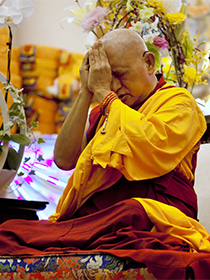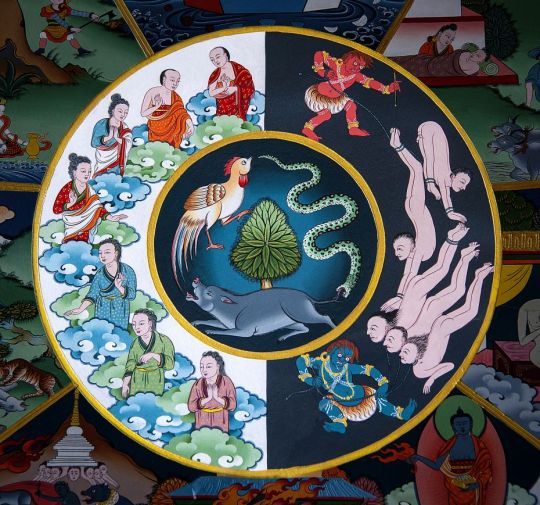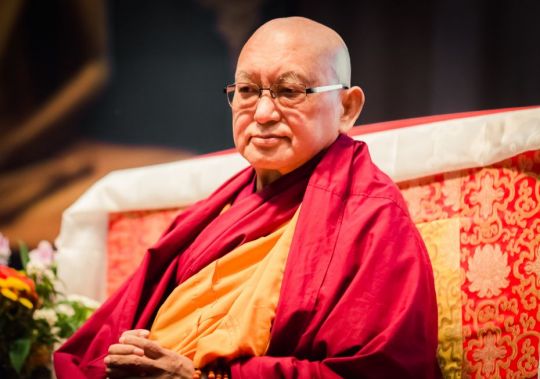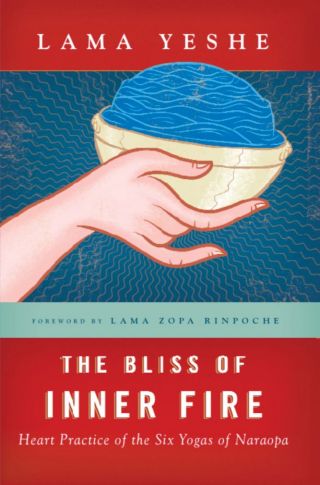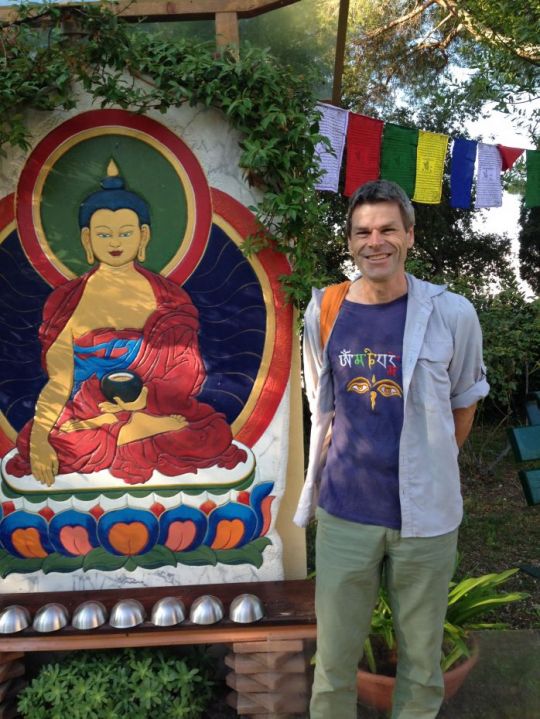- Home
- FPMT Homepage
Foundation for the Preservation of the Mahayana Tradition
The FPMT is an organization devoted to preserving and spreading Mahayana Buddhism worldwide by creating opportunities to listen, reflect, meditate, practice and actualize the unmistaken teachings of the Buddha and based on that experience spreading the Dharma to sentient beings. We provide integrated education through which people’s minds and hearts can be transformed into their highest potential for the benefit of others, inspired by an attitude of universal responsibility and service. We are committed to creating harmonious environments and helping all beings develop their full potential of infinite wisdom and compassion. Our organization is based on the Buddhist tradition of Lama Tsongkhapa of Tibet as taught to us by our founders Lama Thubten Yeshe and Lama Thubten Zopa Rinpoche.
- Willkommen
Die Stiftung zur Erhaltung der Mahayana Tradition (FPMT) ist eine Organisation, die sich weltweit für die Erhaltung und Verbreitung des Mahayana-Buddhismus einsetzt, indem sie Möglichkeiten schafft, den makellosen Lehren des Buddha zuzuhören, über sie zur reflektieren und zu meditieren und auf der Grundlage dieser Erfahrung das Dharma unter den Lebewesen zu verbreiten.
Wir bieten integrierte Schulungswege an, durch denen der Geist und das Herz der Menschen in ihr höchstes Potential verwandelt werden zum Wohl der anderen – inspiriert durch eine Haltung der universellen Verantwortung und dem Wunsch zu dienen. Wir haben uns verpflichtet, harmonische Umgebungen zu schaffen und allen Wesen zu helfen, ihr volles Potenzial unendlicher Weisheit und grenzenlosen Mitgefühls zu verwirklichen.
Unsere Organisation basiert auf der buddhistischen Tradition von Lama Tsongkhapa von Tibet, so wie sie uns von unseren Gründern Lama Thubten Yeshe und Lama Thubten Zopa Rinpoche gelehrt wird.
- Bienvenidos
La Fundación para la preservación de la tradición Mahayana (FPMT) es una organización que se dedica a preservar y difundir el budismo Mahayana en todo el mundo, creando oportunidades para escuchar, reflexionar, meditar, practicar y actualizar las enseñanzas inconfundibles de Buda y en base a esa experiencia difundir el Dharma a los seres.
Proporcionamos una educación integrada a través de la cual las mentes y los corazones de las personas se pueden transformar en su mayor potencial para el beneficio de los demás, inspirados por una actitud de responsabilidad y servicio universales. Estamos comprometidos a crear ambientes armoniosos y ayudar a todos los seres a desarrollar todo su potencial de infinita sabiduría y compasión.
Nuestra organización se basa en la tradición budista de Lama Tsongkhapa del Tíbet como nos lo enseñaron nuestros fundadores Lama Thubten Yeshe y Lama Zopa Rinpoche.
A continuación puede ver una lista de los centros y sus páginas web en su lengua preferida.
- Bienvenue
L’organisation de la FPMT a pour vocation la préservation et la diffusion du bouddhisme du mahayana dans le monde entier. Elle offre l’opportunité d’écouter, de réfléchir, de méditer, de pratiquer et de réaliser les enseignements excellents du Bouddha, pour ensuite transmettre le Dharma à tous les êtres. Nous proposons une formation intégrée grâce à laquelle le cœur et l’esprit de chacun peuvent accomplir leur potentiel le plus élevé pour le bien d’autrui, inspirés par le sens du service et une responsabilité universelle. Nous nous engageons à créer un environnement harmonieux et à aider tous les êtres à épanouir leur potentiel illimité de compassion et de sagesse. Notre organisation s’appuie sur la tradition guéloukpa de Lama Tsongkhapa du Tibet, telle qu’elle a été enseignée par nos fondateurs Lama Thoubtèn Yéshé et Lama Zopa Rinpoché.
Visitez le site de notre Editions Mahayana pour les traductions, conseils et nouvelles du Bureau international en français.
Voici une liste de centres et de leurs sites dans votre langue préférée
- Benvenuto
L’FPMT è un organizzazione il cui scopo è preservare e diffondere il Buddhismo Mahayana nel mondo, creando occasioni di ascolto, riflessione, meditazione e pratica dei perfetti insegnamenti del Buddha, al fine di attualizzare e diffondere il Dharma fra tutti gli esseri senzienti.
Offriamo un’educazione integrata, che può trasformare la mente e i cuori delle persone nel loro massimo potenziale, per il beneficio di tutti gli esseri, ispirati da un’attitudine di responsabilità universale e di servizio.
Il nostro obiettivo è quello di creare contesti armoniosi e aiutare tutti gli esseri a sviluppare in modo completo le proprie potenzialità di infinita saggezza e compassione.
La nostra organizzazione si basa sulla tradizione buddhista di Lama Tsongkhapa del Tibet, così come ci è stata insegnata dai nostri fondatori Lama Thubten Yeshe e Lama Zopa Rinpoche.
Di seguito potete trovare un elenco dei centri e dei loro siti nella lingua da voi prescelta.
- 欢迎 / 歡迎
简体中文
“护持大乘法脉基金会”( 英文简称:FPMT。全名:Foundation for the Preservation of the Mahayana Tradition) 是一个致力于护持和弘扬大乘佛法的国际佛教组织。我们提供听闻,思维,禅修,修行和实证佛陀无误教法的机会,以便让一切众生都能够享受佛法的指引和滋润。
我们全力创造和谐融洽的环境, 为人们提供解行并重的完整佛法教育,以便启发内在的环宇悲心及责任心,并开发内心所蕴藏的巨大潜能 — 无限的智慧与悲心 — 以便利益和服务一切有情。
FPMT的创办人是图腾耶喜喇嘛和喇嘛梭巴仁波切。我们所修习的是由两位上师所教导的,西藏喀巴大师的佛法传承。
繁體中文
護持大乘法脈基金會”( 英文簡稱:FPMT。全名:Found
ation for the Preservation of the Mahayana Tradition ) 是一個致力於護持和弘揚大乘佛法的國際佛教組織。我們提供聽聞, 思維,禪修,修行和實證佛陀無誤教法的機會,以便讓一切眾生都能 夠享受佛法的指引和滋潤。 我們全力創造和諧融洽的環境,
為人們提供解行並重的完整佛法教育,以便啟發內在的環宇悲心及責 任心,並開發內心所蘊藏的巨大潛能 — 無限的智慧與悲心 – – 以便利益和服務一切有情。 FPMT的創辦人是圖騰耶喜喇嘛和喇嘛梭巴仁波切。
我們所修習的是由兩位上師所教導的,西藏喀巴大師的佛法傳承。 察看道场信息:
- FPMT Homepage
- News/Media
-
- Study & Practice
-
-
- About FPMT Education Services
- Latest News
- Programs
- New to Buddhism?
- Buddhist Mind Science: Activating Your Potential
- Heart Advice for Death and Dying
- Discovering Buddhism
- Living in the Path
- Exploring Buddhism
- FPMT Basic Program
- FPMT Masters Program
- FPMT In-Depth Meditation Training
- Maitripa College
- Lotsawa Rinchen Zangpo Translator Program
- Universal Education for Compassion & Wisdom
- Online Learning Center
-
- Prayers & Practice Materials
- Overview of Prayers & Practices
- Full Catalogue of Prayers & Practice Materials
- Explore Popular Topics
- Benefiting Animals
- Chenrezig Resources
- Death & Dying Resources
- Lama Chopa (Guru Puja)
- Lama Zopa Rinpoche: Compendium of Precious Instructions
- Lama Zopa Rinpoche: Life Practice Advice
- Lama Zopa Rinpoche Practice Series
- Lamrim Resources
- Mantras
- Prayer Book Updates
- Purification Practices
- Sutras
- Thought Transformation (Lojong)
- Audio Materials
- Dharma Dates - Tibetan Calendar
- Translation Services
- Publishing Services
- Ways to Offer Support
- Prayers & Practice Materials
-
- Teachings and Advice
- Find Teachings and Advice
- Lama Zopa Rinpoche Advice Page
- Lama Zopa Rinpoche: Compendium of Precious Instructions
- Lama Zopa Rinpoche Video Teachings
- ༧སྐྱབས་རྗེ་བཟོད་པ་རིན་པོ་ཆེ་མཆོག་ནས་སྩལ་བའི་བཀའ་སློབ་བརྙན་འཕྲིན།
- Podcasts
- Lama Yeshe Wisdom Archive
- Buddhism FAQ
- Dharma for Young People
- Resources on Holy Objects
- Teachings and Advice
-
-
*If a menu item has a submenu clicking once will expand the menu clicking twice will open the page.
-
-
- Centers
-
- Teachers
-
- Projects
-
-
-
-
*If a menu item has a submenu clicking once will expand the menu clicking twice will open the page.
-
-
- FPMT
-
-
-
-
-
If your path teaches you to act and exert yourself correctly and leads to spiritual realizations such as love, compassion and wisdom then obviously it’s worthwhile.
Lama Thubten Yeshe
-
-
-
- Shop
-
-
-
The Foundation Store is FPMT’s online shop and features a vast selection of Buddhist study and practice materials written or recommended by our lineage gurus. These items include homestudy programs, prayers and practices in PDF or eBook format, materials for children, and other resources to support practitioners.
Items displayed in the shop are made available for Dharma practice and educational purposes, and never for the purpose of profiting from their sale. Please read FPMT Foundation Store Policy Regarding Dharma Items for more information.
-
-
FPMT Community: Stories & News
22
Seasons Greetings, and December FPMT E-News!
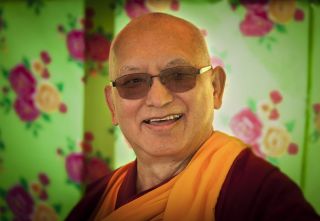
Lama Zopa Rinpoche, Italy, October 2017. Photo by Piero Sirianni.
Warm Seasons Greetings from Lama Zopa Rinpoche and FPMT International Office!
Our greetings come as part of the December FPMT International Office e-News.
As well as our greetings of the season, we bring you:
- A Reminder about Updates to Rinpoche’s Schedule
- Our Year-End Generosity Campaign
- Welcome to the New Issue of Mandala magazine!
- Rejoicing about: A New FPMT Center, and 2 New Study Groups!
Two Fruitful Foundation Service Seminars!
… and more, with lots of lovely photos!
The FPMT International Office News comes from your FPMT International Office. Visit our subscribe page to receive the FPMT International Office News directly in your email box.
20
Venerable Bhikshus, whoever sees dependent and relative origination, sees the Dharma.
Whoever sees the Dharma, sees the Buddha.
What is this dependent and relative origination of which I speak?
It is this: because this exists, that arises. Because this is born, that is born.
It is like this: through the condition of ignorance, compounding factors. From the condition of compounding factors, consciousness … name and form … the six sense spheres … contact … feeling … craving … grasping … existence … birth … aging and death. From the condition of aging and death, agony, wailing, suffering, unhappiness, and mental disturbance all arise. Like that, merely this enormous heap of suffering arises.
—From the Salistamba, or Rice Seedlings Sutra, [translation by Ven. Tenzin Gache] the primary source of teachings on the twelve links of dependent arising.
In his new article for Mandala titled “Personalizing the Twelve Links of Dependent Origination,” Ven. Tenzin Gache shares a comprehensive view of what Lama Tsongkhapa considered to be the most profound teaching from the Buddha.
Exploring each of the twelve links, Ven. Tenzin offers a clear depiction of this Dharma topic, which many practitioners consider to be an elusive subject, and in doing so he offers a thorough account of one of Mahayana Buddhism’s most significant teachings.
Read Ven. Tenzin Gache’s new article “Personalizing the Twelve Links of Dependent Origination” in its entirety:
https://fpmt.org/mandala/in-depth-stories/personalizing-the-twelve-links-of-dependent-origination/
Find more in-depth stories and interviews on Mandala:
https://fpmt.org/mandala/in-depth-stories/
Mandala is offered as a benefit to supporters of the Friends of FPMT program, which provides funding for the educational, charitable and online work of FPMT.
13
Mandala January-June 2018 Out Now!
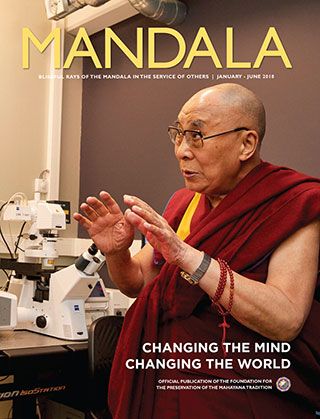
His Holiness the Dalai Lama talking with scientists during his visit to the Université de Strasbourg, France, September 2016. Photo by Olivier Adam.
In our just published Mandala January-June 2018, we explore what Buddhism offers the world in times of global difficulties to help pacify suffering and bring about peace.
As a preview to the print edition, we have made the cover story, “Changing the Mind, Changing the World: The Mind, Karma, and Global Change,” available to read online.
Also in this issue:
- His Holiness the Dalai Lama encourages Buddhists to share the wisdom and thinking of the Buddha and the Nalanda masters in secular ways;
- The Foundation for Developing Compassion and Wisdom offers snapshots of its activities around the world;
- Several FPMT centers, projects, and services share their approaches to being compassionate world citizens; and
- We take an in-depth look at the Inner Job Description, a mindfulness practice tool designed to help those offering service or working in any job transform their efforts into profound, powerful Dharma practice.
Plus, teachings from Lama Yeshe, Lama Zopa Rinpoche, new photos, interviews, and much more!
Find all our exclusive online stories for Mandala January-June 2018 and information on how to receive a print copy here:
https://fpmt.org/mandala/archives/mandala-for-2018/january-june/
Mandala is offered as a benefit to supporters of the Friends of FPMT program, which provides funding for the educational, charitable and online work of FPMT. The new issue is also available through the FPMT Foundation Store.
- Tagged: mandala
6
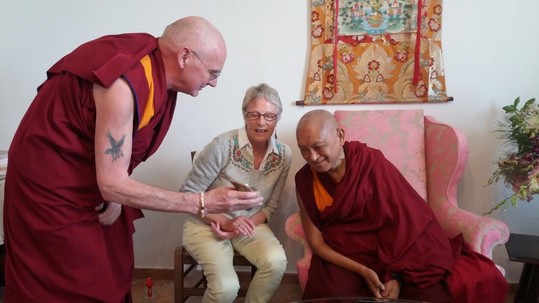
Lama Zopa Rinpoche being shown the Inner Job Description app on a phone, with Ven. Roger Kunsang and Wendy Ridley, Istituto Lama Tzong Khapa, Italy, October 2017. Photo by Violette Pilot.
Would you like help in transforming your daily life into Dharma practice? If so, the Inner Job Description App is for you.
Initially produced as a card for practitioners to write upon, the Inner Job Description (IJD) is now available as an app for mobile devices.
Like the ‘pen and paper’ version of the IJD, the app is tool for developing mindfulness of our thoughts, speech, and actions. By using the IJD daily, our increased awareness of self-defeating mental habits can allow us to change our minds in positive ways.
As Lama Zopa Rinpoche notes in “How to Be a Real Professional,” “You have all these external professions—how to do this, how to do that from school, college, and university—but without inner professionalism: how to live life, how to do everything mentally, how to do everything—business or professional activity, whatever you do—with pure attitude, positive mind, non-ignorance, non-anger, non-attachment, especially with the non-selfish mind.” By tracking your behavior over time, you will learn how to make every day a profound inner practice.

A screen shot of the Inner Job Description App landing page.
The Inner Job Description was designed to help us understand how we can develop as “inner professionals,” transforming our service into Dharma practice.
The app enables you to track your progress throughout the day, and then to review how you are developing as an inner professional. You can choose to receive regular reminders from the app in the form of inspiring quotes by Lama Zopa Rinpoche and Lama Thubten Yeshe.
We invite you to use the IJD Mindfulness Practice App to become an inner professional. Download the Inner Job Description App for free on Google Play and the Apple App Store (search for Inner Job Description).
The app is due to the kindness of a generous sponsor, allowing the digital IJD to be offered free of charge. Currently the app is only available in English, but we are exploring the possibility of making the app available in other languages.
The Inner Job Description practice is an essential part of the FPMT Foundation Service Seminar, which we recommend to anyone already offering, or considering offering, service in the FPMT organization
Look out for an interview with Amy Cayton, FPMT Service Seminar Coordinator, about the IJD and the Foundation Service Seminar, in the January–June 2018 issue of Mandala magazine.
Learn more about the Inner Job Description online, where you can downlowd the IJD Card, watch a video on how to use the IJD, and find links to the app:
https://fpmt.org/education/training/inner-job-description/
Mandala is offered as a benefit to supporters of the Friends of FPMT program, which provides funding for the educational, charitable and online work of FPMT.
FPMT.org and Mandala Publications brings you news of Lama Zopa Rinpoche and of activities, teachings, and events from over 160 FPMT centers, projects, and services around the globe. If you like what you read, consider becoming a Friend of FPMT, which supports our work.
- Tagged: ijd, inner job description
29
In September of this year, Lama Zopa Rinpoche visited Panchen Losang Chogyen Gelugzentrum (PLC) in Austria. This was Rinpoche’s first official visit and the first opportunity for Austrian students to attend teachings, receive an initiation, and to take refuge from Rinpoche. Center director Stefan Seidler shares a brief overview of Rinpoche’s time in Vienna:
In September, Lama Zopa Rinpoche arrived for the first time in Vienna. Many of us are still feeling the presence of our precious guru in our hearts and minds.
From the very first moments at the airport, where spiritual program coordinator Andrea Husnik, myself, and many students from Panchen Losang Chogyen Gelugzentrum welcomed him, everybody felt Rinpoche‘s incredible kindness, generosity, and the warmth of heart.
After one night in a hotel, Rinpoche and his entourage moved into a wonderful old house in a quiet area in the north of Vienna, where they would stay for the next two weeks and which had been offered very generously by the parents of one of PLC’s board members.
Hard work was required to prepare the house for so many visitors, and the benefits everybody received from Rinpoche have been enormous. He was so kind to share much of his precious time with the host family, even learning how to make apple strudel. Rinpoche’s mere presence—his wisdom, his laugh, his never-ending kindness to everyone in the house—gave them all so much inspiration that every domestic task became a pure joy.
Also during the visit, all of the center’s board members and main volunteers had the opportunity to spend time with Rinpoche. As almost none of the center members in Vienna had met Rinpoche before, this visit was an amazing and rare opportunity for all of them. A very nice dinner for board members and volunteers was held in Vienna’s city center, and a wonderful, inspiring private visit to the center itself prepared us all for the big weekend to come.
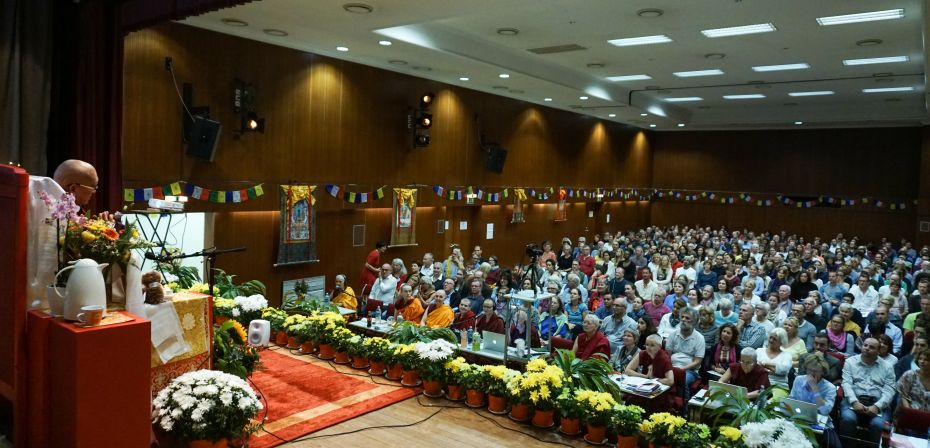
Lama Zopa Rinpoche teaching in Vienna, Austria, September 2017. Photo courtesy of Ven. Sherab.
Almost 400 people registered and the venue, which we had rented, was fully packed for all three days. Besides people from Austria and Germany, many others traveled from all over Europe to visit Vienna. We had guests from Spain, the UK, the Czech Republic, Switzerland, France, Italy and many more countries, all eager to attend Rinpoche’s teachings.
Rinpoche’s teachings were amazing. With the help of transcriber Ven. Joan Nicell and translators Ven. Birgit Schweiberer and Ven. Paloma Alba, we were able to understand Rinpoche’s limitless wisdom.
After the teachings, Rinpoche also gave refuge. More than 50 people took refuge and, for most of them, this was also their first chance to have direct contact with Rinpoche. Later, attendees received a Medicine Buddha initiation.
For everybody from the Vienna center, everybody who attended the teachings, and of course everybody who helped plan, organize, and prepare this great visit, we’re sure the benefits and inspiration of the visit will last for a long time. PLC is very grateful that we could host our guru Lama Zopa Rinpoche and we hope he will come back very soon!
Watch Lama Zopa Rinpoche’s September 2017 teachings in Vienna, Austria, on Rinpoche Available Now:
https://fpmt.org/media/streaming/teachings-of-lama-zopa-rinpoche/lama-zopa-rinpoche-teachings-vienna-tabs/
For more information on the programs and schedule of Panchen Losang Chogyen Gelugzentrum:
http://www.gelugwien.at
FPMT.org and Mandala Publications brings you news of Lama Zopa Rinpoche and of activities, teachings, and events from over 160 FPMT centers, projects and services around the globe. If you like what you read, consider becoming a Friend of FPMT, which supports our work.
- Tagged: great medicine buddha initiation, lama zopa rinpoche, panchen losang chogyen, panchen losang chogyen gelugzentrum
22
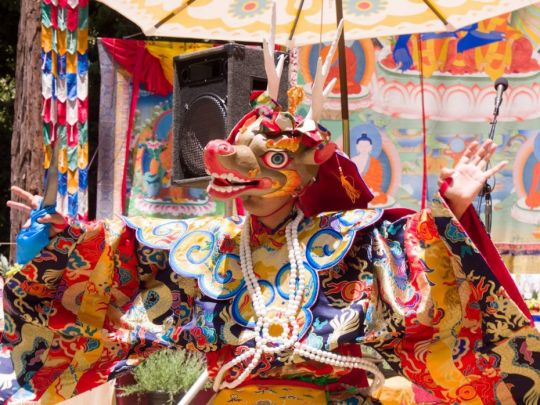
Tenzin Monlam performs the deer dance at Land of Medicine Buddha, Soquel, California, US, July 2017. Photo courtesy of Denice Macy.
Building projects manager Denice Macy at Land of Medicine Buddha (LMB) in California recently shared a useful how-to list for hosting a large-scale Dharma event:
In November 2002, Sally Barraud, then director of Land of Medicine Buddha, received advice from Lama Zopa Rinpoche to host a Medicine Buddha Festival at LMB at least once a year. Pearls of wisdom flowed from Rinpoche’s mouth—the advice of what to do, what to offer. With unwavering faith, Sally went to work with her team and the local community to host the first Medicine Buddha Festival. Sally reached out to Geshe Ngawang Drakpa from Tse Chen Ling in San Francisco, Ven. Donyo at Gyuto Vajrayana Center in the Bay Area, and Tam To, a local leader of the Vietnamese community in San Jose. Eight months later, the festival became a reality.
What follows is some practical advice that we have learned from hosting the Medicine Buddha Festival for the past fifteen years.
Before anything—go for refuge.
We are in service to our guru, who is at times, a hilarious comic. Have fun (Rinpoche does), laugh at mistakes (Rinpoche does), experience it all with compassion (Rinpoche does)! Buckle up and get ready for a fun and wild ride by hosting a large Dharma event to benefit others!
1. Identify the main purpose of your event.
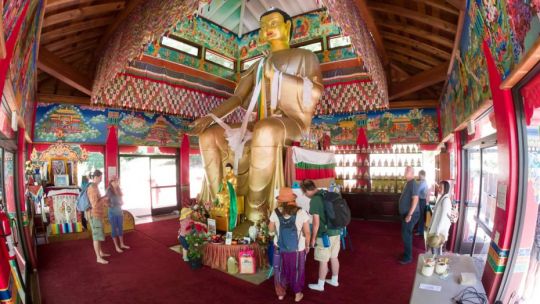
Wish Fulfilling Temple, Land of Medicine Buddha, Soquel, California, US, July 2017. Photo courtesy of Denice Macy.
This will be your guide as you organize your event. For LMB, the main purpose as advised by Rinpoche was and is to give as many people as possible the opportunity to take part in the Medicine Buddha puja, to learn about the Medicine Buddha, to provide people with the opportunity to make extensive offerings to please the Buddha, and the opportunity to create imprints and merit! Easy enough!
2. Plan well ahead!
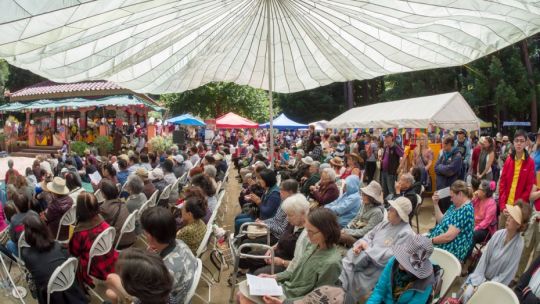
Attendees at the Land of Medicine Buddha festival in Soquel, California, US, July 2017. Photo courtesy of Denice Macy.
A successful LARGE event, Dharma or secular, needs to be planned well in advance. We look at dates as much as a year in advance. Some of the factors we consider include: the weather, dates of public holidays, seasonal events, other regularly scheduled festivals, and community events. If you fail to consider these factors, you may find that people who might benefit from your event are otherwise previously committed or that the weather is a bummer. Big party, big fun, big love!
3. Speaking of big, think BIG!
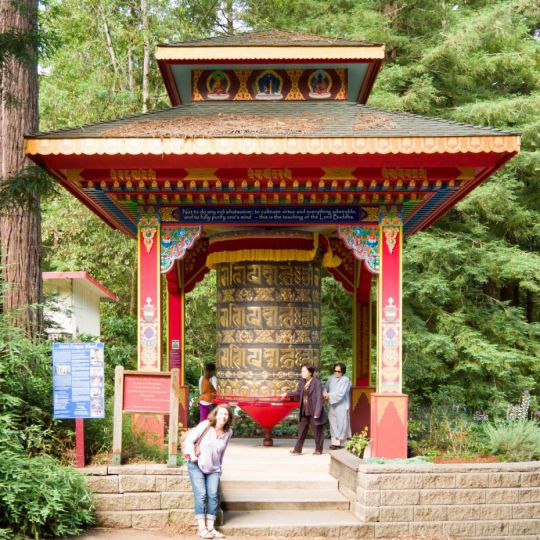
Mani prayer wheel at the Land of Medicine Buddha in Soquel, California, US, July 2017. Photo courtesy of Denice Macy.
Rinpoche helps us to identify how to please and benefit sentient beings. Consider the many different dispositions of sentient beings. Some people might attend because they love the delicious free food, others might have interest in the Tibetan culture, others want to connect with community, others have strong karmic connection to the Dharma, and some are looking for a wholesome family event—so provide varied opportunities. We have yet to provide pony rides around our stupa as Rinpoche requested, but it is in the plans! Not only would this benefit the ponies, but also the kids who would ride or lead them around the stupa.
4. Consider varied potential interest groups in your community.
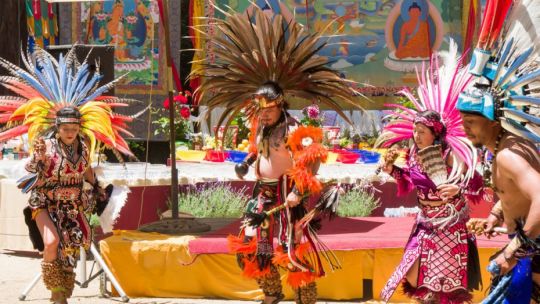
Sun Family Meixca Dance – Medicine Buddha Festival in Soquel, California, US, July 2017. Photo courtesy of Denice Macy.
Shine the Dharma light, spread your net wide. Let people know about your event; it is a priceless opportunity for you to connect and benefit others. We pay for advertising on the local public radio stations, in the weekly community newspaper, and sponsor adverts on Facebook. Don’t forget to take advantage of free media opportunities by sending out press releases to the local daily newspapers and online news sites, and using email messages and Facebook. We also print large posters that are placed at the center and email digital copies of them to our community connections.
5. Plan a non-sectarian Dharma event.
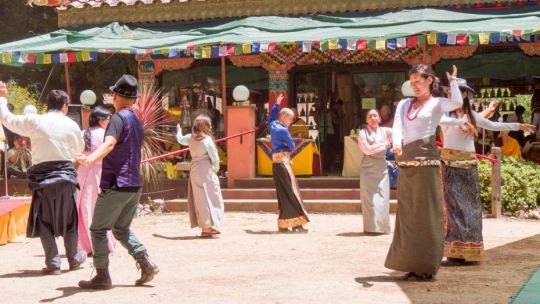
Tibetan dancers at the Medicine Buddha Festival in Soquel, California, US, July 2017. Photo courtesy of Denice Macy.
Don’t limit your audience. Rinpoche gave us the advice to invite all the area Dharma centers including Zen, mindfulness-based groups, Chinese, Vietnamese, and other Tibetan lineage centers. This is an opportunity to join with and welcome the diversity of our Dharma community. Of course, inviting other FPMT projects and centers is a must. Offer local FPMT family centers, projects, and services a table at your event to share information about their programs. Invite animal rescue groups or other non-profit organizations that align with benefiting sentient beings.
6. Re-read advice from Rinpoche on how to hold these large events.
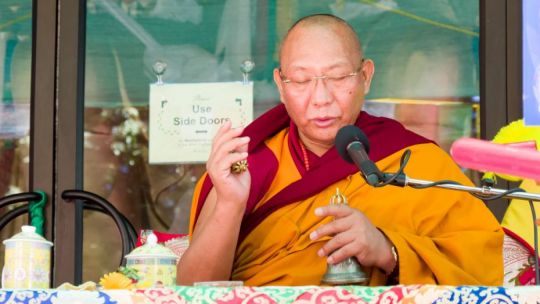
Dagri Rinpoche at the Land of Medicine Buddha Festival in Soquel, California, US, July 2017. Photo courtesy of Denice Macy.
Duh. Of course, none of us would intentionally ignore precious advice that we have received from Rimpoche. However, it is IMPORTANT to re-read advice (again, months in advance). You will likely find it is not possible to do everything Rinpoche advises right away, or even in the first few years of holding an annual event. You may find like us, however, that it is possible to add elements each year in a practical way. It took years for us to find Mongolian acrobats in our area, but eventually we did!
7. Practice generosity and pleasing sentient beings.
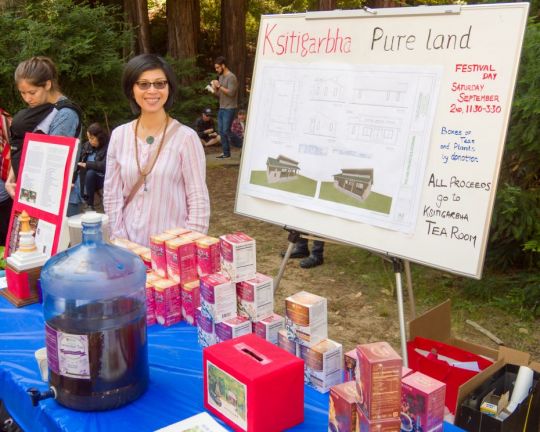
Fundraising and offering donations at the Medicine Buddha Festival, Soquel, California, US, July 2017. Photo courtesy of Denice Macy.
Make meaningful and generous offerings to the people who contribute to the day: festival t-shirts for volunteers, offerings of money and special treats to the Sangha, and generous offerings to those who make music or dance offerings. Here, remember to make as extensive offerings as possible on your altars, and give people an opportunity to sponsor those offerings. People from around the world who are unable to attend your event may have the wish to participate by sponsoring various offerings.
8. Support your team, meet, and follow up.
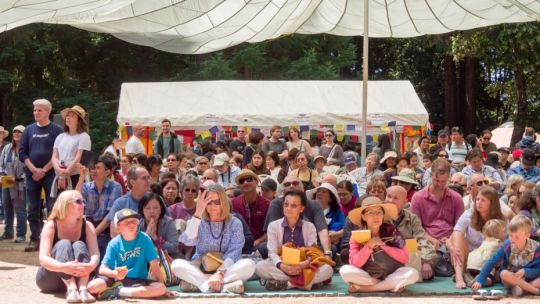
Attendees at the Medicine Buddha Festival in Soquel, California, US, July 2017. Photo courtesy of Denice Macy.
Even the most enthusiastic and reliable community members have obstacles that will arise. It is helpful to share information and to-do lists on Google Docs and other online methods of communication. Have a volunteer coordinator, logistics coordinator, liaison with performers, and parking coordinator. Make lists and meet in person with your team. Make plans to follow up so you can make adjustments as issues arise.
9. Remember that you may not have time in the last days before the event to do X, Y, or Z.
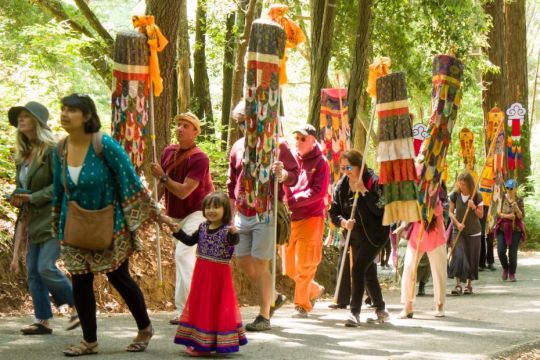
Parade at the Medicine Buddha Festival in Soquel, California, US, July 2017. Photo courtesy of Denice Macy.
Do it now! Funny things happen when making plans for Dharma events. One year in the middle of June, a large tree fell blocking the road to our center for more than twelve hours—the day before our event! Another year someone drove a car over a cliff. It is interesting to recall how obstacles can arise and surprise. If you leave things to the final days before an event, the stress level of your team may go through the roof. Do as much as you can now. Make lists with your team that can be completed well in advance. Leave a lot of space in the last few days to be surprised by things not going exactly as planned.
10. Trust your team!
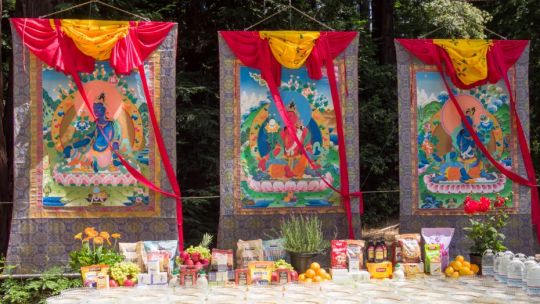
Three of the Eight Great Bodhisattvas, Land of Medicine Buddha, Soquel, California, US, July 2017. Photo courtesy of Denice Macy.
The mind that sees problems is persistent (speaking for myself here). Remember you have an amazing team with Rinpoche at the head; Rinpoche inspires us to stretch ourselves, and if we trust Rinpoche’s advice, we can move ahead with faith that we have the skill, team, and karma for a successful event. Though we are limited and may learn some uncomfortable lessons along the way, we are on the right path!
Read more about the festivities, spiritual programs, and life in the community at Land of Medicine Buddha: http://landofmedicinebuddha.org/
FPMT.org and Mandala Publications brings you news of Lama Zopa Rinpoche and of activities, teachings and events from over 160 FPMT centers, projects and services around the globe. If you like what you read, consider becoming a Friend of FPMT, which supports our work.
- Tagged: festival days, land of medicine buddha
17
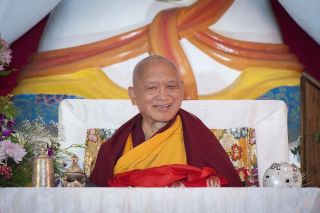
Lama Zopa Rinpoche during the 100 Million Mani Retreat, Istituto Lama Tzong Khapa, Italy, October 2017. Photo by Piero Sirianni.
Welcome to the November FPMT International Office e-News!
This month we bring you news about:
- The New Inner Job Description App
- Updates from Two FPMT Charitable Projects
- Who Friends of FPMT Help
- How to Give a Gift That Helps Others
- The Lotsawa Rinchen Zangpo Translator Program
…and more!
The FPMT International Office News comes from your FPMT International Office. Visit our subscribe page to receive the FPMT International Office News directly in your email box.
- Tagged: lama zopa rinpoche news
15
Trey Ligon’s Tale of Discovering the Dharma
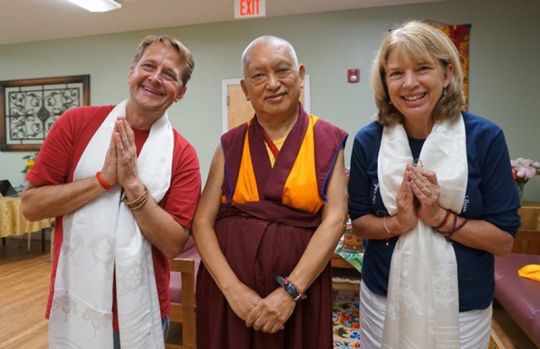
Trey Ligon and his wife, Anne, with Lama Zopa Rinpoche, Reno, Nevada, United States, August 2017. Photo by Lobsang Sherab.
Events that lead to the founding of FPMT centers, projects, and services can be as varied and inspirational as the benefit that they provide.
The Dharmakaya Center in Reno, Nevada, United States, has an origin story that the founder, Trey Ligon, recently shared in a letter of thanks to Lama Zopa Rinpoche. Just eight years ago, Trey went out into the woods to look for his cat, triggering a series of incredible events that would pass through personal crisis, but which would ultimately present the opportunity to spread the Dharma.
So inspiring was Trey’s letter that Lama Zopa Rinpoche offered a translation of a new Green Tara prayer. Rinpoche asked that Trey’s story be shared with the FPMT community.
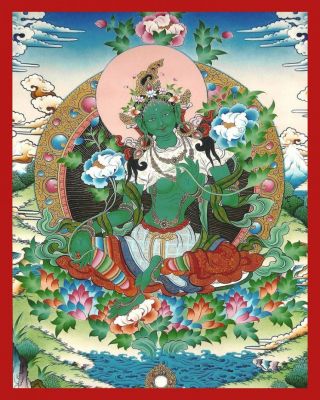
Green Tara
Dear Precious Lama Zopa Rinpoche,
I want to thank you for everything you do for all sentient beings and for your kind and generous gifts to my wife Anne and me. It was such a blessing for both of us to be able to visit with you at the Light of the Path retreat. I wanted to offer you greater detail of the story that I had started to share with you about how Arya Tara pointed me towards you, my Guru.
In 2009, I was walking in the woods near my house and it was starting to get dark, so I began to hurry and suddenly caught my foot on a fallen log. I fell to the ground in significant pain and could not stand on one leg. I looked at my foot and discovered that I could not move it to any degree. I could not stand up or put any weight on it to walk. (Later, I found out that I had a compound fracture in my right ankle.) I yelled out for help, but no one answered. I tried yelling louder and louder, but no one answered back, so I started to crawl and drag my disconnected ankle with me. It was painful as I crawled along the ground slowly.
My knees and arms started to become cut-up from the rough ground and I felt I could not go on any longer, so I started to pray for help. Again, no one came to assist me. Then I started to cry out for help and at that moment, my savior, Arya Green Tara, appeared to me in the darkness. As she looked at me, her beautiful green light shined around her, so I could now see where I was crawling and once again had hope. When I stopped crawling to clean the rocks out of my bloody arms, Arya Green Tara would encourage me to keep going towards the house lights. She told me that I was so lucky to be born at this time as a human being because my past root guru was alive and well spoken in the Buddhadharma at this time. She told me that I should go seek him out to continue my practice. She told me to go look for the “Medicine Buddha Guru” and that my guru was always the “Ultimate Healer.” As I got closer to the house, I was found and rushed to the hospital.
One week later, I had a surgery to reattach my ankle bone with implants (metal rods, screws, and plates) and while recovering at home, I remembered Mother Tara’s words and decided to pick up my laptop to search for “Medicine Buddha Guru as the Ultimate Healer.” Your book, Ultimate Healing: The Power of Compassion came up in my search results. I ordered the book online and as I read each page, your teachings felt so comfortable and resonated with me. It was as if you were there in the room talking directly to me. The obvious next step was for me to go find my guru.
I discovered online that you were giving a lamrim teaching and a Medicine Buddha practice near me in San Francisco in 2011. I made arrangements to come see you for the first time. I immediately had a strong connection and could not get enough of your teachings and I knew what I had to do next.
I wrote you a letter asking you what you thought about starting a new Dharma center where I live in Reno, Nevada, near Lake Tahoe. You surprised me by writing back a lengthy, precious letter with more than enough confirmations for me to begin the process of organizing a new study group. With the help of some wonderful Buddhists, we opened a study group in an empty space in my medical business. It was always your letter to me that kept me going in the early days—so, thank you so much, Guru. You then gave us the name “Dharmakaya Study Group.” Wow!
After three years as a study group, I rejoice to share with you that in 2015 we became “Dharmakaya Center” and through your many examples and teachings, we will always strive to be most beneficial for all sentient beings.
With much love and devotion, Trey Ligon
Read Lama Zopa Rinpoche’s translation of the new Green Tara Prayer
Read more about the programs and study opportunities at the Dharmakaya Center in Reno, Nevada, United States.
FPMT.org and Mandala Publications brings you news of Lama Zopa Rinpoche and of activities, teachings, and events from over 160 FPMT centers, projects, and services around the globe. If you like what you read, consider becoming a Friend of FPMT, which supports our work.
- Tagged: dharmakaya study group, green tara, trey ligon
8
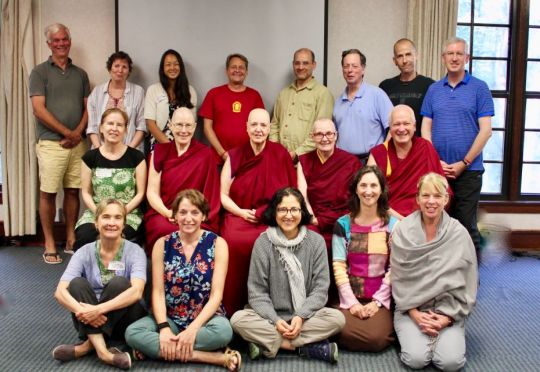
Participants of the FPMT North America Regional Meeting during the Light of the Path retreat in Black Mountain, North Carolina, US, August 2017. Photo courtesy of Drolkar McCallum.
In August 2017, Drolkar McCallum, regional coordinator for FPMT North America and member services coordinator for the International Mahayana Institute—FPMT’s international community of nuns and monks—visited Black Mountain, North Carolina, United States, for the Light of the Path (LOP) retreat. During the retreat, which was led by Lama Zopa Rinpoche, FPMT North America held a successful and highly enjoyable regional meeting. Droklar offered her reflections:
FPMT North America held a successful and enjoyable regional meeting over August 22 and 23 during the Light of the Path (LOP) retreat in Black Mountain, North Carolina.
Twenty-two participants representing International Office and a group of twelve centers, projects, services, and study groups from all over the US and Canada came together with a few registered teachers to discuss revenue generation, live streaming, grievance procedures, and the importance of International Sangha Day.
There was an informative presentation given by Annelies van der Heijden from Maitreya Instituut in the Netherlands on the immense value of the Foundation Service Seminars. Jill Marie from Kadampa Center spoke about fundraising; Tom Truty spoke about the current projects of Education Services; and I outlined the importance of moving forward in FPMT’s regionalization strategy in order to fulfill Lama Zopa Rinpoche’s wishes for the organization.
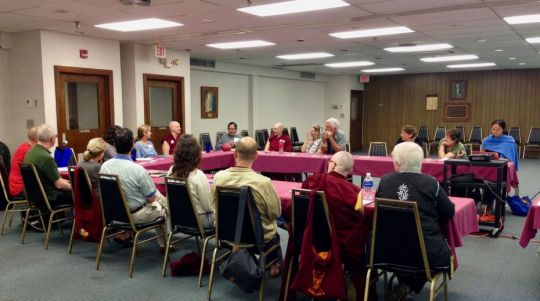
FPMT North America Regional Meeting during the Light of the Path retreat in Black Mountain, North Carolina, US, August 2017. Photo courtesy of Drolkar McCallum.
Even though the meeting was shorter than normal, one benefit of having it at the beginning of LOP is that people were introduced to each other at the start and then had plenty of time and opportunity during the retreat to get together and discuss other issues and do some mutually beneficial brain showering!
The greatest advantage, of course, is that our most precious guru, Kyabje Lama Zopa Rinpoche, was nearby and his blessings caused great inspiration, creativity, and a willingness to get more involved.
FPMT.org and Mandala Publications brings you news of Lama Zopa Rinpoche and of activities, teachings, and events from over 160 FPMT centers, projects, and services around the globe. If you like what you read, consider becoming a Friend of FPMT, which supports our work.
3
“We only started carrying ebooks in 2015, starting with Lama Yeshe Wisdom Archive’s titles. In 2016, Editions Mahayana and Ediciones Dharma agreed to let us host their French and Spanish titles, respectively. And now in 2017, Wisdom Publications worked with us to find a way to carry its titles, like Lama Zopa Rinpoche’s How to Enjoy Death and Lama Yeshe’s The Bliss of Inner Fire, too. There are even some ebooks that are only available by donation, such as Tenzin Ösel Hita’s Do Not Believe Everything You Think.
“Forty percent of our customers live outside of the United States so it was important to spread Dharma while bringing shipping costs to zero. Fewer print copies means we potentially make less of an impact on global forests, which is something really important to me. Also, I really hope that more young people engage with Buddhism, and since they are into digital devices of all kinds, making popular titles available in ebook format is one way to encourage that. I’m really pleased with the progress we’ve made in this area so far.”
Check out the Foundation Store’s 108 ebook titles today:
https://shop.fpmt.org/View-All-eBooks_c_551.html
Mandala brings you news of Lama Zopa Rinpoche and of activities, teachings, and events from over 160 FPMT centers, projects and services around the globe. If you like what you read in Mandala, consider becoming a Friend of FPMT, which supports our work.
- Tagged: ebooks, foundation store
1
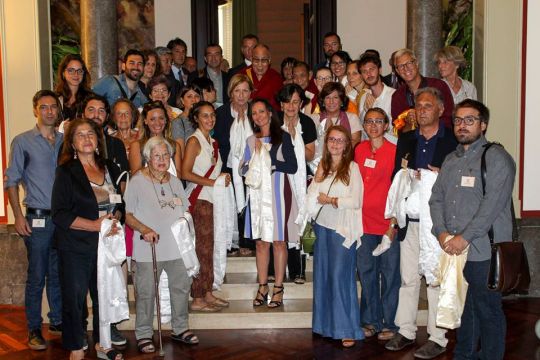
His Holiness the Dalai Lama with devotees in Palermo, Sicily, Italy, September 2017. Photo by Ugo Gorvaia.
This September, His Holiness the Dalai Lama took a short tour of the Italian island of Sicily. During a visit to the town of Palermo, His Holiness was awarded the status of “Honorary Citizen” by the mayor, Professor Lealuca Orlando.
The brief presentation took place at the Teatro Massimo, the venue for a talk in which His Holiness addressed the subject of peace and the meeting of peoples. The talk, in front of 1,400 attendees, took place ahead of a smaller gathering of media and Italian students at His Holiness’s hotel.
Centro Muni Gyana students Fabio Gariffo and Grazia Asaro were in attendance at the theater and hotel. They recorded their experiences:
At the hotel, His Holiness addressed the practitioners from Centro Muni Gyana, saying, “And now I want to speak with the group of Lama Zopa.”
The center, established in 2009, occupies a villa that local authorities confiscated from the mafia. To this audience of students, whose center is housed in a building that has changed purpose with the times, His Holiness spoke on the importance of studying Buddhism with an evolving, modern perspective.
His Holiness remarked that when he teaches in Europe or in the United States, he has no interest in proselytizing. However, he emphasized that understanding the function of mind and emotions, a study that Tibetan Buddhism has inherited and preserved from the Nalanda tradition, is very valuable and useful for everyone. He added that many people wish to study the tradition of Nalanda, brought to Tibet from India in the 8th century by the great scholar, philosopher, psychologist, and logician Shantarakshita. It can be said that authentic Buddhism, the one based on logical reason, was imported by him, and that Tibetans are the only ones who have fully maintained this ancient tradition.
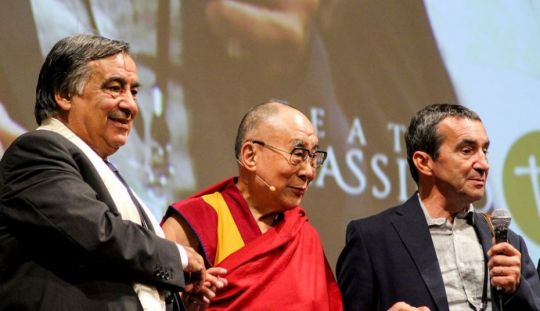
His Holiness the Dalai Lama at the Teatro Massimo in Palermo, Sicily, Itlay, September 18, 2017. Photo courtesy of Centro Muni Gyana.
“The Buddha himself,” continued His Holiness, “has recommended not to follow blindly his teachings, but to analyze them and to examine their effectiveness in our own experience. This analytic spirit is the most useful way to embrace the Buddhist teachings.
“The scientists I periodically meet are very amazed by the depth of the intuitions of Nalanda’s scholars. Let me say that modern psychology is far from the science of mind that comes from this ancient monastic university. For this reason, the bases of this tradition are necessary, and there is a great benefit in their integration with Western subjects of study such as psychology and quantum physics.
“For about forty years I have made great changes within the Tibetan community, emphasizing that the most important thing is not the rituals, but the study of the texts—a message that is also valid for the nunneries, where today it’s possible to obtain the complete curriculum of thirty years of study required to become a geshe. Therefore, Dharma centers must be, first of all, academies and centers of study.
“So in your center, even if it’s small, you must consider yourself students! I’m eighty-two and I still consider myself a student.”
“In this way,” he concluded, “we can contribute to society. Today there is a great emotional crisis all over the world and this secular knowledge can make a big contribution toward eliminating it.”
Read more about Centro Muni Gyana:
http://centromunigyana.it/
FPMT.org and Mandala Publications brings you news of Lama Zopa Rinpoche and of activities, teachings, and events from over 160 FPMT centers, projects, and services around the globe. If you like what you read, consider becoming a Friend of FPMT, which supports our work.
27
Istituto Lama Tzong Khapa (ILTK) in Pomaia, Italy, is currently hosting the month-long 100 Million Mani Retreat, guided by Lama Zopa Rinpoche. From October 4 to November 5, hundreds of participants will collectively recite OM MANI PADME HUM, the mantra of Chenrezig (Avalokiteshvara), the Buddha of Compassion, 100 million times.
Students from all over the world are in attendance, including one person who has perhaps traveled further than most. Paul, a New Zealander who arrived in Italy by way of Australia, told one of the retreat organizers about his motivation behind the journey all the way from the southern hemisphere and his experience of the retreat so far. Here’s the story:
You are from New Zealand and you live in Australia, what made you come all the way up here?
Paul: I consider Lama Zopa Rinpoche as my main teacher, the one I have a connection with. Recently, I had the feeling that I should spend more time in front of him. Fortunately, I could be away from work for the entire month of October.
Have you already attended teachings, initiations, or retreats with Lama Zopa Rinpoche?
Yes. I was at the Great Chenrezig retreat at Chenrezig Institute and the Medicine Buddha retreat in Adelaide, both in Australia. Besides, I did the Kopan November course once.
Have you seen some of your fellow students from Kopan?
Oh, yes. I met quite a few of them again. It feels like after a wedding. One finds again friends sharing one’s same experience or sharing common friends.
Can you say that there is a kind of Kopan community? Do you find it supportive?
It is nice to know that you have friends around the world following a similar path. It gives me a feeling of interconnectedness.
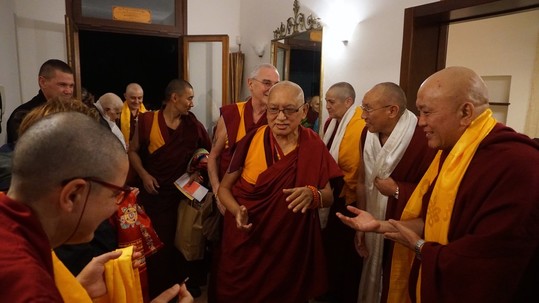
Lama Zopa Rinpoche arriving at Istituto Lama Tzong Khapa, Italy, October 2017. Photo by Ven. Lobsang Sherab.
For more information on the 100 Million Mani Retreat and the programs offered at Istituto Lama Tzong Khapa visit:
https://www.iltk.org/
You can watch Lama Zopa Rinpoche teach live from the 100 Million Mani Mantra Retreat on YouTube and Facebook. For links and details:
https://fpmt.org/media/streaming/lama-zopa-rinpoche-live/
More information, photos, and updates about FPMT spiritual director Lama Zopa Rinpoche can be found on Rinpoche’s webpage on FPMT.org. If you’d like to receive news of Lama Zopa Rinpoche and FPMT via email, sign up to FPMT News.
- Home
- News/Media
- Study & Practice
- About FPMT Education Services
- Latest News
- Programs
- New to Buddhism?
- Buddhist Mind Science: Activating Your Potential
- Heart Advice for Death and Dying
- Discovering Buddhism
- Living in the Path
- Exploring Buddhism
- FPMT Basic Program
- FPMT Masters Program
- FPMT In-Depth Meditation Training
- Maitripa College
- Lotsawa Rinchen Zangpo Translator Program
- Universal Education for Compassion & Wisdom
- Online Learning Center
- Prayers & Practice Materials
- Overview of Prayers & Practices
- Full Catalogue of Prayers & Practice Materials
- Explore Popular Topics
- Benefiting Animals
- Chenrezig Resources
- Death & Dying Resources
- Lama Chopa (Guru Puja)
- Lama Zopa Rinpoche: Compendium of Precious Instructions
- Lama Zopa Rinpoche: Life Practice Advice
- Lama Zopa Rinpoche Practice Series
- Lamrim Resources
- Mantras
- Prayer Book Updates
- Purification Practices
- Sutras
- Thought Transformation (Lojong)
- Audio Materials
- Dharma Dates – Tibetan Calendar
- Translation Services
- Publishing Services
- Teachings and Advice
- Find Teachings and Advice
- Lama Zopa Rinpoche Advice Page
- Lama Zopa Rinpoche: Compendium of Precious Instructions
- Lama Zopa Rinpoche Video Teachings
- ༧སྐྱབས་རྗེ་བཟོད་པ་རིན་པོ་ཆེ་མཆོག་ནས་སྩལ་བའི་བཀའ་སློབ་བརྙན་འཕྲིན།
- Podcasts
- Lama Yeshe Wisdom Archive
- Buddhism FAQ
- Dharma for Young People
- Resources on Holy Objects
- Ways to Offer Support
- Centers
- Affiliates Area
- Teachers
- Projects
- Charitable Projects
- Make a Donation
- Applying for Grants
- News about Projects
- Other Projects within FPMT
- Support International Office
- Projects Photo Galleries
- Give Where Most Needed
- FPMT
- Shop
Translate*
*powered by Google TranslateTranslation of pages on fpmt.org is performed by Google Translate, a third party service which FPMT has no control over. The service provides automated computer translations that are only an approximation of the websites' original content. The translations should not be considered exact and only used as a rough guide.If you cherish another person, another sentient being, there is enlightenment and you cause them to achieve every happiness. If you don’t cherish them, there is no enlightenment for you. Therefore, this person, this one sentient being, is the most precious one in one’s own life. Therefore, what is called I needs to be let go forever. And what is called other, even one sentient being, that is to be cherished forever.







